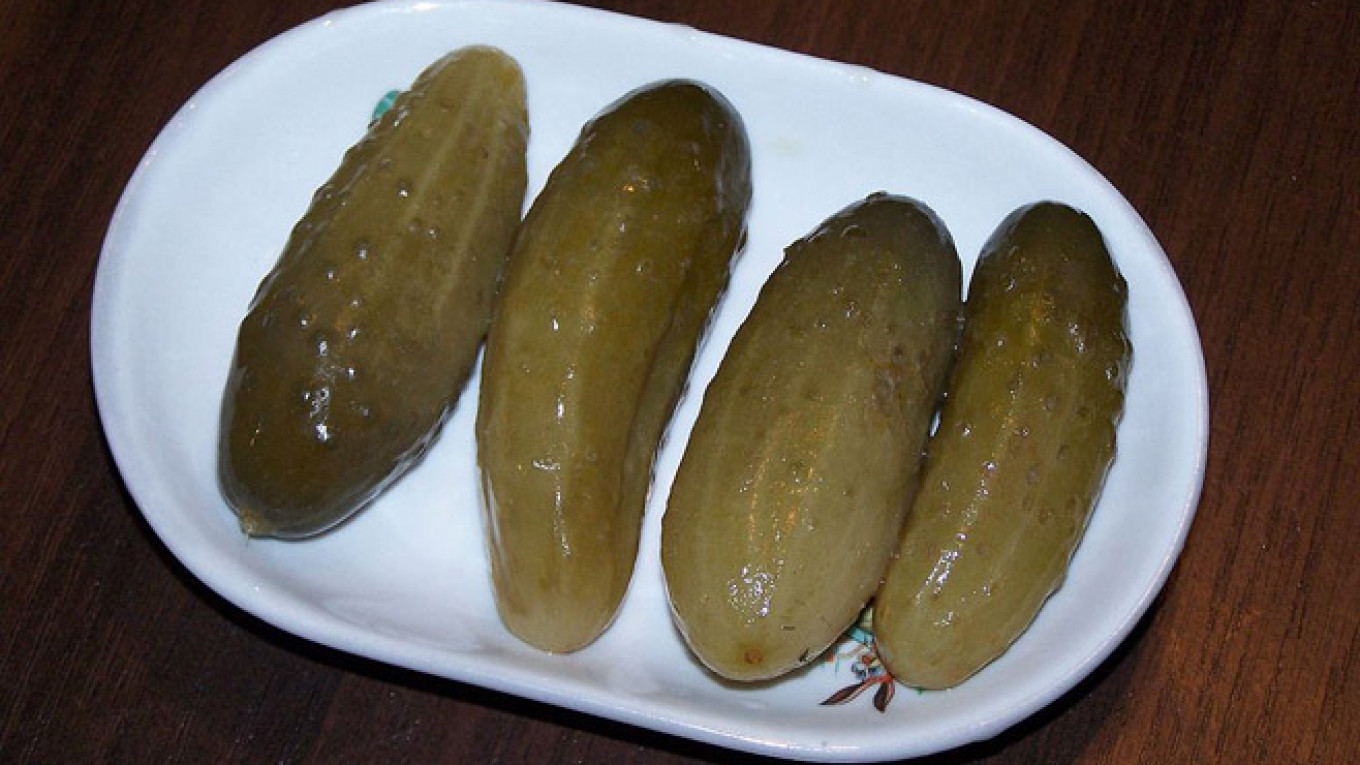ST. PETERSBURG — An old Russian saying goes: "Pickling is a spiritual activity. A clean mind and pleasant mood must be found in any type of weather. Rude encounters on the street must be released. Spouses must be forgiven. And when all this is done and the moon is waning, then it is a day for pickling."
Maya Markeliya, chef of St. Petersburg's Baklazhan Restaurant, will not enter her kitchen for pickling unless she is in the right frame of mind.
Pickling Recipe
Maya Markeliya, chef of Baklazhan Restaurant, shares an easy-to-make pickling recipe with the key ingredient being the right frame of mind while preparing.
Pickled Cucumbers
Tomatoes can be used instead of cucumbers — the recipe remains the same.
Ingredients:
• 700g cucumbers
• 20g peeled garlic
• 3g black peppercorns
• 20g salt
• 10g sugar
• 20ml table vinegar (9 percent)
• 10g dill
• 10g parsley
• 10g horseradish leaf
• 10g cherry leaves
• Bay leaves
• 300ml filtered water
Makes 1 liter jar
Method:
Wash and prepare the cucumbers. Place them in a steamed, sterile jar and mix together with horseradish leaves, peeled garlic, dill, parsley and cherry leaves.
To prepare the pickle juice, boil water and then add vinegar, sugar, salt, black peppercorns and bay leaves. Pour into the jar and close with a lid. Shake the jar a few times to help mix the juice throughout.
"Ten people can take the same ingredients and make 10 different-tasting pickles. You need to have the proper relationship with your cooking. You have to smile, enjoy yourself and feel really good. Your soul goes into your pickles. If you feel bad, they won't be delicious," Markeliya said in a recent interview with The St. Petersburg Times.
Luckily, the actual technique of pickling is a little less complicated.
Although the correct steps in the pickling process must be followed, adding a little more of this or that is allowed according to preferences as long as the golden middle is respected and experimentation is not overdone.
And pickles can be made from most garden and forest produce.
Markeliya pickles fruits, vegetables and even the flowers of colchis bladdernut, which produce a small, curled pickle with a sinewy and fibrous texture that are probably best known by the Georgian name "jon joli."
Markeliya admits that she must get some of her more exotic ingredients and spices directly from Georgia because they are not easily found in local markets.
Watermelon is another one of Markeliya's more unusual pickles, but she said it's not a favorite among her local customers. However, pickled watermelon is well respected in southern regions and the Caucasus where people tend to have slightly different tastes from northern Russians, including an affection for spicier dishes.
"The most important thing in a Georgian pickle is chili pepper. And Georgians have large barrels of horseradish and use it in everything. But in our restaurant, we make milder pickles because Russians don't like them hot the way Georgians do," Markeliya said.
Ingredients also differ slightly according to local food excesses and traditional expectations. "For Russians it's exotic to add beets to pickles. Here cabbage is white and cucumbers are green. But in Georgia, all pickles are red because we always add beets."
Of course, pickles are not exclusive to Georgia and Russia. They can be found almost anywhere on the globe. Chutney in India, kimchi in Korea, kosher pickles in New York, miso pickles in Japan, salted herring in Scandinavia, pickled duck eggs in China, corned beef in Ireland, salsa in Mexico — they're all pickles.
And pickling does much more than simply preserve produce. It also changes the taste and texture in a profusion of interesting ways that has contributed to some unique cultural preferences, such as a penchant for spicy sour tastes in Southeast Asia and acidic flavors in Eastern Europe.
For thousands of years our ancestors have explored ways to pickle foods during harvest to provide essential vitamins and minerals during long winter months and secure food supplies for famine and other times of need.
Today international trade between different climates and seasonal regions tends to keep tables more diverse year round, but regardless of the increased variety in the winter produce section at the supermarket, pickles show no deterioration of their long history of occupying a special place on the Russian table. They have been, and are likely to remain, the quintessential appetizer and compliment for vodka and Georgia's famous grape brandy, chacha.
"Every Russian table fitted for a party or otherwise is filled with pickles," Markeliya said, adding that her favorite pickle is green tomato and she makes sure to use a lot of fresh greens and spices and recommends that adding ingredients like black currant leaves, garlic and horseradish significantly boost the health benefits of pickles.
So as some Russians say, around this time of year when gardens and hearts alike are overflowing, it is a promising moment for achieving unforgettably tasty pickles and healthy shot chasers for later days when a reminder of past good vibrations can be most appreciated.
Contact the author at artsreporter@imedia.ru
A Message from The Moscow Times:
Dear readers,
We are facing unprecedented challenges. Russia's Prosecutor General's Office has designated The Moscow Times as an "undesirable" organization, criminalizing our work and putting our staff at risk of prosecution. This follows our earlier unjust labeling as a "foreign agent."
These actions are direct attempts to silence independent journalism in Russia. The authorities claim our work "discredits the decisions of the Russian leadership." We see things differently: we strive to provide accurate, unbiased reporting on Russia.
We, the journalists of The Moscow Times, refuse to be silenced. But to continue our work, we need your help.
Your support, no matter how small, makes a world of difference. If you can, please support us monthly starting from just $2. It's quick to set up, and every contribution makes a significant impact.
By supporting The Moscow Times, you're defending open, independent journalism in the face of repression. Thank you for standing with us.
Remind me later.






